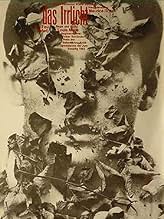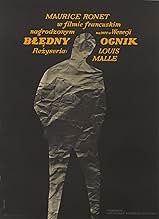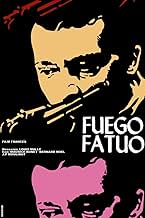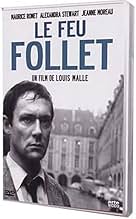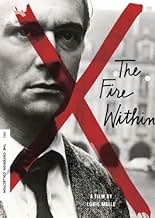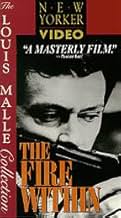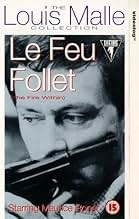PUNTUACIÓN EN IMDb
7,8/10
11 mil
TU PUNTUACIÓN
Alain Leroy, abandona la clínica donde fue desintoxicado. Conoce a amigos y mujeres tratando de encontrar un motivo para seguir viviendo. ¿Le ayudará esto?Alain Leroy, abandona la clínica donde fue desintoxicado. Conoce a amigos y mujeres tratando de encontrar un motivo para seguir viviendo. ¿Le ayudará esto?Alain Leroy, abandona la clínica donde fue desintoxicado. Conoce a amigos y mujeres tratando de encontrar un motivo para seguir viviendo. ¿Le ayudará esto?
- Dirección
- Guión
- Reparto principal
- Premios
- 2 premios y 2 nominaciones en total
René Dupuy
- Charlie
- (as René Dupuis)
Reseñas destacadas
Wonderful study of the last day in the life of a man. This movie has one specific scene where Alan Leroy (Maurice Ronet), sitting at a cafe in Paris, takes his first alcoholic drink after months of rehabilitation. This scene is complimented by stunning photography of Chislain Cloquet and the haunting music of Eric Satie. Malle captures the true meaning of existentialist philosophy and manages to create a movie that does not wallow in self-pity but instead celebrates our ability to choose whether to live or die.
10paula-60
This is a mesmerising film about suicide as a rational way out. Ronet is wonderful in the role, sweetly sad, boyishly charming, tragically self-aware. His loving, well-meaning friends he visits on the way to the final "checking-out" are an interesting study and their inability to connect with Ronet or perceive where he's heading is poignant. For me, the best Louis Malle ever. The choice of music is great as well.
Le Feu Follet or "Will o'the wisp" as it can be translated into English is one of the most important philosophical films made by the great master of French cinema Louis Malle.It is based on a book written by Pierre Drieu la Rochelle who was influenced by Dadaism. Although this film talks of a difficult albeit dark theme of suicide the film's overall mood is not at all gloomy. This is because there are plenty of scenes infused with day to day humor.The film is about a protagonist who has lost all interest in life.Maurice Ronet,a major French film star of the sixties plays the lead role.He is a sort of celebrity among his circle of socialites and he is fed up of their useless company.The film portrays the last days of a person suffering from a drug habit.In some ways this film is an attack on middle class or French bourgeoisie.Although the protagonist is a part of it,he nevertheless makes vain attempts to untangle himself from it.If a separate genre of suicide films is formed, this film will easily find a proud place in that category.
"The Fire Within" (French, 1963): Directed by Louis Malle, scored by Eric Satie. This is a perfect visual reason to use black and white with tons of gray. It is two days in the life of a young, popular man who has returned to his acquaintances, friends and ex-lovers, after vanishing into a program for alcoholics
a program he found comforting, and did NOT want to leave. He searches through his relationships for a reason to continue his life, whether as-is or anew
but overriding any thoughts of the future is his current state of total depression. His friends continued their lives during his absence, they continue their fast-paced, challenging repartee during his visits, and they will clearly continue after his leaving. "The Fire Within" is a quiet, observational film, interrupted only for conversations that seem to have substance, yet offer no solutions. It has one goal, and meets it very well.
THE FIRE WITHIN is a drama about a former alcoholic, who is at the crossroads between life and death in a state of a deep depression. It is based on the novel "Will O' the Wisp" by Pierre Drieu La Rochelle.
Alain, a recovering alcoholic at a rehabilitation clinic in Versailles suffers with a depression. He often thinks about suicide, but still tries to find some valid reasons for living. He is in complete contrast with a behavior of his friends, which further enhances his internal conflict...
Mr. Malle gently touches sore points of a depressed man. His hero is empty and defeated man, who is trapped between a drunken past and an uncertain future. Many of the protagonists, who are full of compassion and love, going through his frustrating life. He's a lost soul, who can not let go of his depressive everyday life. However, a man, without an imagination and love, must find his own peace and certainty. A recovery from alcohol is an ironic view of a collapsed life.
Regardless of a state of his mind and heart, his tragic appearance is not quite clear. This is a kind of flaw of this film, because the main protagonist has condemned himself to a tragic end, before he has considered any options. An authentic scenery emphasizes his escape from any opportunities in life.
Maurice Ronet as Alain Leroy has offered a convincing performance. He is a lonely man who helplessly wanders...search, and then run away from love and certainty.
Life is a kind of agony in this case.
Alain, a recovering alcoholic at a rehabilitation clinic in Versailles suffers with a depression. He often thinks about suicide, but still tries to find some valid reasons for living. He is in complete contrast with a behavior of his friends, which further enhances his internal conflict...
Mr. Malle gently touches sore points of a depressed man. His hero is empty and defeated man, who is trapped between a drunken past and an uncertain future. Many of the protagonists, who are full of compassion and love, going through his frustrating life. He's a lost soul, who can not let go of his depressive everyday life. However, a man, without an imagination and love, must find his own peace and certainty. A recovery from alcohol is an ironic view of a collapsed life.
Regardless of a state of his mind and heart, his tragic appearance is not quite clear. This is a kind of flaw of this film, because the main protagonist has condemned himself to a tragic end, before he has considered any options. An authentic scenery emphasizes his escape from any opportunities in life.
Maurice Ronet as Alain Leroy has offered a convincing performance. He is a lonely man who helplessly wanders...search, and then run away from love and certainty.
Life is a kind of agony in this case.
¿Sabías que...?
- CuriosidadesFor the first two days, filming was done in color. However, director Louis Malle realized that this was a distraction from the story, so he decided to film in black-and-white. An assistant also later declared that the shooting atmosphere on the set was rather gloomy.
- PifiasAs Alain walks on the streets of Paris, the crew (pushing the dolly) is visible on the shop windows he passes by.
- Citas
Alain Leroy: I'm killing myself because you didn't love me, because I didn't love you. Because our ties were loose, I'm killing myself to tighten them. I leave you with an indelible stain.
- Banda sonoraTrois Gymnopédies
Written by Erik Satie
Selecciones populares
Inicia sesión para calificar y añadir a tu lista para recibir recomendaciones personalizadas
- How long is The Fire Within?Con tecnología de Alexa
Detalles
- Fecha de lanzamiento
- País de origen
- Sitio oficial
- Idioma
- Títulos en diferentes países
- El foc follet
- Localizaciones del rodaje
- Empresa productora
- Ver más compañías en los créditos en IMDbPro
- Duración1 hora 48 minutos
- Color
- Mezcla de sonido
- Relación de aspecto
- 1.66 : 1
Contribuir a esta página
Sugerir un cambio o añadir el contenido que falta

Principal laguna de datos
By what name was El fuego fatuo (1963) officially released in India in English?
Responde
![Ver Bande-annonce [OV]](https://m.media-amazon.com/images/M/MV5BODdiNzczOTktMmMxMC00ZGQ0LTg4YWItZWEzN2FkZTViODk1XkEyXkFqcGdeQXRyYW5zY29kZS13b3JrZmxvdw@@._V1_QL75_UY281_CR0)
